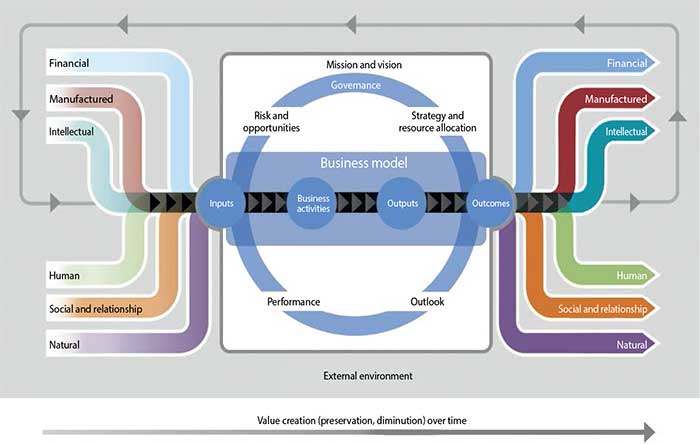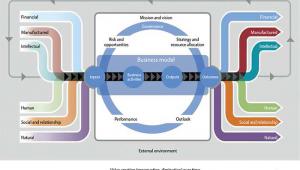ntegrated reporting value creation

Assessing how organisations create value using the six capitals is key to integrated reporting
Integrated reporting requires organisations to adopt a more holistic, long-term mindset that understands the interaction between different organisational silos and the value of six forms of capital – financial, manufactured, intellectual, human, social and relationship, and natural.
Speaking to PF, Gillian Fawcett, head of government faculty at CIPFA, said this allowed integrated reports to interpret huge organisational complexity and interconnectedness. Combined with a focus on outcomes, she said this made it a good fit for the public sector.
“It gives public organisations the opportunity to demonstrate the real value they bring for very limited resources, given the increasing focus on austerity,” she said.
Grant Patterson, a former IIRC public sector programme lead and currently a director at Grant Thornton, agreed <IR> goes “beyond the surplus or deficit” an organisation makes and evidences value creation in the broader sense – for example, how an organisation fosters economic opportunity by creating jobs.
“From the perspective of the public sector that is very important, because you don’t have a share price for a hospital or municipality.”
But it also forces organisations to “understand themselves better”, Patterson continued. “While the reports are externally focused, it really drives an internal change as well.”
<IR> gives a clearer focus on the opportunities and risks ahead, and the strategy needed to ensure the organisation meets its goals and creates value now and in to the future. “Organisations that have done that say they operate better than beforehand,” he highlighted.
As well as operating amid unprecedented strain on time and resources, public sector organisations are also facing a growing tide of public distrust in institutions. Fawcett said the broader picture of value creation that <IR> allows, with its emphasis on a longer-term vision and openness, can help restore that trust.
“It brings confidence for the taxpayer and other stakeholders that an organisation has good governance and is spending wisely and for the future,” Patterson agreed.
He noted that it can also prevent the next generation from for paying for spending today. “Succinctly, it means sustainable public services,” he said.
But despite integrated reporting’s public sector suitability, Fawcett acknowledged that uptake in public organisations lags far behind that of their corporate peers.
“Hopefully this report will shine a light on <IR> and really encourage public sector leaders to understand what it is and consider adopting it in their own organisations. Government is really big business, bigger than some multinationals, and should be leading by example.”
“It really needs that senior team to own the process,” Patterson added. “A key challenge is organisational buy in.”
CIPFA chief executive Rob Whiteman added the report showed how integrated reporting can be applied by public sector leaders so that they think more broadly about value creation in their organisation. “Integrated reporting will enable them to think about the outcomes they are aiming for – not only in financial terms, but also in terms of society, the natural world, and human and intellectual capital,” he added.
CIPFA, the IIRC and their partners will use Focusing on Value Creation in the Public Sector to ensure public sector leaders globally understand the value of adopting Integrated Reporting. This will be followed during 2017 by guidance that will further help public sector organizations to implement the International <IR> Framework.
The publication comes after the IIRC appointed a new chief executive. Richard Howitt, a member of the European Parliament from the UK Labour Party and the parliament’s rapporteur on corporate social responsibility, will succeed Paul Druckman on 1 November.













